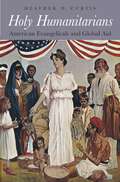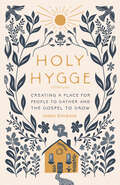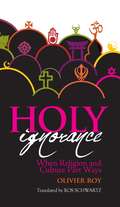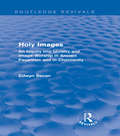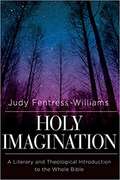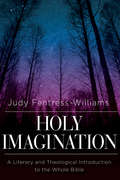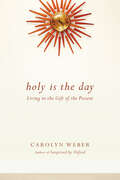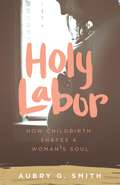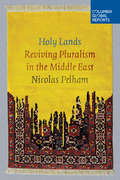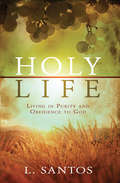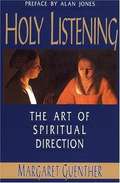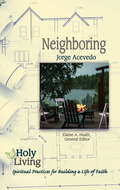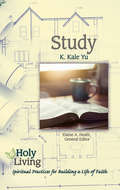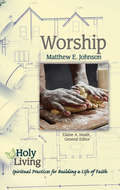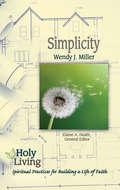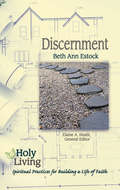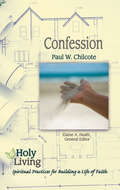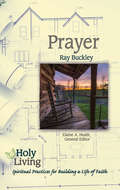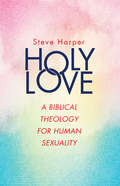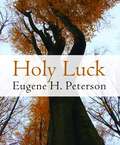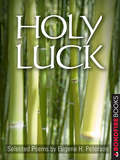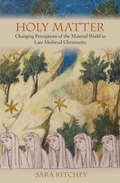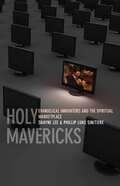- Table View
- List View
Holy Humanitarians: American Evangelicals and Global Aid
by Heather D. CurtisOn May 10, 1900, an enthusiastic Brooklyn crowd bid farewell to the Quito. The ship sailed for famine-stricken Bombay, carrying both tangible relief—thousands of tons of corn and seeds—and “a tender message of love and sympathy from God’s children on this side of the globe to those on the other.” The Quito may never have gotten under way without support from the era’s most influential religious newspaper, the Christian Herald, which urged its American readers to alleviate poverty and suffering abroad and at home. In Holy Humanitarians, Heather D. Curtis argues that evangelical media campaigns transformed how Americans responded to domestic crises and foreign disasters during a pivotal period for the nation. Through graphic reporting and the emerging medium of photography, evangelical publishers fostered a tremendously popular movement of faith-based aid that rivaled the achievements of competing agencies like the American Red Cross. By maintaining that the United States was divinely ordained to help the world’s oppressed and needy, the Christian Herald linked humanitarian assistance with American nationalism at a time when the country was stepping onto the global stage. Social reform, missionary activity, disaster relief, and economic and military expansion could all be understood as integral features of Christian charity. Drawing on rigorous archival research, Curtis lays bare the theological motivations, social forces, cultural assumptions, business calculations, and political dynamics that shaped America’s ambivalent embrace of evangelical philanthropy. In the process she uncovers the seeds of today’s heated debates over the politics of poverty relief and international aid.
Holy Hygge: Creating a Place for People to Gather and the Gospel to Grow
by Jamie EricksonWomen were made to give life—and they can do that right in their own homes. Hygge [HYOO-guh] has become a cultural buzzword. When many read about this Danish practice, their shoulders lift in excitement, then fall in exhale. In a culture of rush, hygge appeals to their desire for rest—for slow living, shared moments, and fostered friendships. Hygge has strong ties to beauty, contentment, and well-being. It&’s warm and inviting. Hygge is the opposite of hustle. It eschews abundance. It savors. It takes things slow and envelopes you in sanctuary. Hygge is home. When you sit in a comfy chair by the fire, that&’s hygge. When you arrange a fresh bouquet of wildflowers on a bedside table, that&’s hygge too. Candles, soft furnishings, natural light, fresh-baked pastries, intimate gatherings with friends—these are what come to mind when you think of hygge. But hygge can be so much more. In Holy Hygge, author Jamie Erickson unites the popular Danish practice with the deep, theological truths of the gospel. She unpacks the seven tenets of hygge: hospitality, relationships, well-being, atmosphere, comfort, contentment, and rest. In addition, Erickson shows how the external veneer of a lifestyle can create a life-giving home only when placed under the hope of the gospel. Holy Hygge provides practical ideas for using hygge to gather people and introduce them to faith in Christ. Each chapter concludes with discussion questions, Scripture references, and a prayer.
Holy Hygge: Creating a Place for People to Gather and the Gospel to Grow
by Jamie EricksonWomen were made to give life—and they can do that right in their own homes. Hygge [HYOO-guh] has become a cultural buzzword. When many read about this Danish practice, their shoulders lift in excitement, then fall in exhale. In a culture of rush, hygge appeals to their desire for rest—for slow living, shared moments, and fostered friendships. Hygge has strong ties to beauty, contentment, and well-being. It&’s warm and inviting. Hygge is the opposite of hustle. It eschews abundance. It savors. It takes things slow and envelopes you in sanctuary. Hygge is home. When you sit in a comfy chair by the fire, that&’s hygge. When you arrange a fresh bouquet of wildflowers on a bedside table, that&’s hygge too. Candles, soft furnishings, natural light, fresh-baked pastries, intimate gatherings with friends—these are what come to mind when you think of hygge. But hygge can be so much more. In Holy Hygge, author Jamie Erickson unites the popular Danish practice with the deep, theological truths of the gospel. She unpacks the seven tenets of hygge: hospitality, relationships, well-being, atmosphere, comfort, contentment, and rest. In addition, Erickson shows how the external veneer of a lifestyle can create a life-giving home only when placed under the hope of the gospel. Holy Hygge provides practical ideas for using hygge to gather people and introduce them to faith in Christ. Each chapter concludes with discussion questions, Scripture references, and a prayer.
Holy Ignorance: When Religion and Culture Part Ways (Columbia/Hurst)
by Olivier RoyOlivier Roy, world renowned authority on Islam and politics, finds in the modern disconnection between faith communities and sociocultural identities a fertile space for fundamentalism to grow. Instead of freeing the world from religion, secularization has encouraged a kind of holy ignorance to take root, an anti-intellectualism that promises immediate, emotional access to the sacred and positions itself in direct opposition to contemporary pagan culture. The secularization of society was supposed to free people from religion, yet individuals are converting en masse to fundamentalist faiths, such as Protestant evangelicalism, Islamic Salafism, and Haredi Judaism. These religions either reconnect adherents to their culture through casual referents, like halal fast food, or "deculturate" through "purification" rituals, such as speaking in tongues, a practice that allows believers to utter a language entirely their own. Instead of a return to traditional religious worship, we are now witnessing the individualization of faith and the disassociation of faith communities from ethnic and national identities. This has placed culturally integrated religions, such as Catholicism and eastern orthodox Christianity, on the defensive, and presents new challenges to state and society. Roy explores the options available to powers that hope to integrate or control these groups and whether marginalization or homogenization will further divide believers from their culture.
Holy Images: An Inquiry into Idolatry and Image-Worship in Ancient Paganism and in Christianity (Routledge Revivals #1933)
by Edwyn BevanFirst published in 1940, this title presents four of the Gifford Lectures in natural theology given by Edwyn Bevan in 1933: ‘An Inquiry into Idolatry and Image-Worship in Ancient Paganism and Christianity’. Reference is made throughout all four lectures not only to the conventional disputes in Western Christianity, but also to the attitudes of Hebrew, Pagan, Patristic, Muslim and Eastern thinkers towards the role of symbols and symbolism in worship. In this way, a subject of perennial fascination and importance is placed in a broad historical context, and innovative lines of enquiry are developed with clarity and insight. Holy Images offers an intriguing and easily accessible resource to students of theology, comparative religion, religious anthropology and philosophy.
Holy Imagination: A Literary And Theological Introduction To The Whole Bible
by Judy Fentress-WilliamsThe many voices in scripture form a dialogue with readers, which produce theological truths that are larger than the individual parts. This introduction is informed by both literary theory and theology. It groups sections of the whole Bible together by genre. Each section identifies and describes the genre (such as historiography, poetry, prophecy, gospel, letter, apocalypse), and then moves into a discussion about the literary characteristics and theological insights. The words of scripture not only come a long way to find us but like a poem must be read with attention. Poetry doesn’t yield meaning easily, and it doesn’t promise to make sense. We know to look past the words on the page and find the images, tropes, sounds, and metaphors that are meaning-full. This type of writing invites, rather demands, the imagination. We must accept that we will only get so close, but that this is close enough. Our imagination spans the gaps left by sparse language and incomplete narratives. We return again and again, with more information and perhaps more experiences. The words are the same, but we are not; and for that reason there are always new discoveries. “At last, an introduction that students will enjoy reading, because it is at once engaging, informative, and eye-opening, as well as completely lucid. Fentress Williams shows how many books of the Bible reflect the experience of marginalized persons and communities in precarious situations, and therefore how they speak in ways both realistic and encouraging to contemporary readers. Do your students and yourself a favor: adopt this text and get ready for serious conversation about ancient texts that never go out of date.” – Ellen F. Davis, Amos Ragan Kearns Distinguished Professor of Bible and Practical Theology, Duke Divinity School
Holy Imagination: A Literary and Theological Introduction to the Whole Bible
by Judy Fentress-WilliamsThe many voices in scripture form a dialogue with readers, which produce theological truths that are larger than the individual parts. This introduction is informed by both literary theory and theology. It groups sections of the whole Bible together by genre. Each section identifies and describes the genre (such as historiography, poetry, prophecy, gospel, letter, apocalypse), and then moves into a discussion about the literary characteristics and theological insights.The words of scripture not only come a long way to find us but like a poem must be read with attention. Poetry doesn’t yield meaning easily, and it doesn’t promise to make sense. We know to look past the words on the page and find the images, tropes, sounds, and metaphors that are meaning-full. This type of writing invites, rather demands, the imagination. We must accept that we will only get so close, but that this is close enough. Our imagination spans the gaps left by sparse language and incomplete narratives. We return again and again, with more information and perhaps more experiences. The words are the same, but we are not; and for that reason there are always new discoveries.“At last, an introduction that students will enjoy reading, because it is at once engaging, informative, and eye-opening, as well as completely lucid. Fentress Williams shows how many books of the Bible reflect the experience of marginalized persons and communities in precarious situations, and therefore how they speak in ways both realistic and encouraging to contemporary readers. Do your students and yourself a favor: adopt this text and get ready for serious conversation about ancient texts that never go out of date.”– Ellen F. Davis, Amos Ragan Kearns Distinguished Professor of Bible and Practical Theology, Duke Divinity School
Holy Is the Lord (Expanded Edition)
by Jim CowanHoly is the Lord: Into Thy Presence (Vol 1), Lord, Draw Me Nearer (Vol 2), I Worship You (Vol 3), With All My Heart (Vol 4), Forever to Reign (Vol 5), In This Upper Room (Vol 6). Millennium III: Walk on Water (Vol 1), Awesome God (Vol 2), The Days of Elijah (Vol 3), I'm Trading My Sorrows (Vol 4), Jesus Lifted High (Vol 5)
Holy Labor: How Childbirth Shapes a Woman's Soul
by Aubry G. SmithWomen are valued for their ability to bear children in many cultures. The birth process, though supposedly the most painful experience of a woman's life, is seen as a necessary evil to achieve the end goal of children and motherhood. And yet, in the face of a typically masculinized Christianity that nevertheless professes that women are equally created in the image of God, shouldn't childbirth--a uniquely feminine experience--itself shape Christian women's souls and teach them about the heart of the God they love and follow? Drawing on her own experience of giving birth and motherhood--and the conflicting assumptions attached to them, by Christians and the culture at large--Aubry G. Smith presents a richly scriptural exploration of common conceptions about pregnancy and childbirth that will not only help mothers and soon-to-be mothers understand how to think biblically about birth, but also walks them through how to put the ideas into practice in their own lives. Along the way, she shows all readers how to see God's own experience of the birth process--and how childbirth leads to a deeper understanding of the gospel overall.
Holy Lands: Reviving Pluralism in the Middle East
by Nicolas PelhamWhen the Ottoman Empire fell apart, colonial powers drew straight lines on the map to create a new region - the Middle East - made up of new countries filled with multiple religious sects and ethnicities. Syria, Iraq and Lebanon, for example, all contained a kaleidoscope of Sunnis, Kurds, Shias, Circassians, Druze and Armenians. Israel was the first to establish a state in which one sect and ethnicity dominated others. Sixty years later, others are following suit, like the Kurds in northern Iraq, the Sunnis with ISIS, the Alawites in Syria, and the Shias in Baghdad and northern Yemen.The rise of irredentist states threatens to condemn the region to decades of conflict along new communal fault lines. In this book, Economist correspondent and New York Review of Books contributor Nicolas Pelham looks at how and why the world's most tolerant region degenerated into its least tolerant. Pelham reports from cities in Israel, Kurdistan, Iraq and Syria on how triumphant sects treat their ethnic and sectarian minorities, and he searches for hope - for a possible path back to the beauty that the region used to and can still radiate.
Holy Life: Living in Purity and Obedience to God
by L Santos"You can 'accept Jesus' all you want, but Romans 6:16 teaches us that if you keep on sinning and do not turn to God wholeheartedly, it leads to death," writes author L. Santos. In Holy Life, Santos passionately dismisses the widely-held misconception that being a Christian requires little or no effort on our part, while explaining that the Christian life should flow from a heart full of love, not lived by a set of rules. Relevant for new believers and Christians seeking to renew their commitment to living their lives for the Lord, Holy Life takes the guesswork out of finding the answers to pivotal questions like, How is a true believer to act, behave, and think in this world? How should I live my life to prove to God that I have repented of my sins and turned to Him?
Holy Listening: The Art of Spiritual Direction
by Margaret GuentherGuenther uses the images of the spiritual director as host, teacher, and midwife to describe the ministry of spiritual direction today. She pays particular attention to spiritual direction for women, and addresses such down-to-earth questions as setting, time, and privacy. The stories of real people bring the practice of spiritual direction alive.<P><P> “In the pages that follow, I will attempt to describe the shape that spiritual direction might take for people of our time, aware that the subject is an elusive one. I am speaking to the beginner, those persons lay or ordained, with or without formal theological training, who find themselves drawn to this ministry. Perhaps they feel the stirring of their own unacknowledged gifts. Or perhaps they wonder about receiving direction, whether it is a ministry available to ‘ordinary people' or reserved for the especially holy. I hope some dark corners will be illuminated and some questions answered.”
Holy Living: Spiritual Practices for Building a Life of Faith (Holy Living)
by Jorge Acevedo"While physical training has some value, training in holy living is useful for everything. It has promise for this life now and the life to come." (1 Timothy 4:8 CEB) Christians crave a deeper, more intimate relationship with God. The spiritual disciplines are historical practices that can guide us in our daily walk, bringing us closer to Christ. The Holy Living series brings a fresh perspective on the spiritual disciplines, enabling us to apply their practices to our current lives. Practicing these spiritual disciplines opens us to God's transforming love.Both the Old and New Testaments call the people of God to love God completely as well as to love our neighbors as we love ourselves. Jesus told his followers these were the greatest commandments. What if by "neighbor," Jesus literally meant the precious people who live in your neighborhoods? What if by "neighbor," Jesus meant all of your neighbors, regardless of age, socioeconomic status, or any other potentially divisive designation? This book first defines what is meant by the spiritual practice of "neighboring" and then looks at ways we can live into neighboring as a spiritual practice in our own lives and in the lives of our churches and communities.This is one of series of eight books. Each book in this series introduces a spiritual practice, suggests way of living the practice daily, and provides opportunities to grow personally and in a faith community with others who engage with the practice. Each book consists of an introduction and four chapters and includes questions for personal reflection and group discussion.Other disciplines studied: Celebration, Confession, Discernment, Prayer, Simplicity, Study, and Worship.
Holy Living: Spiritual Practices for Building a Life of Faith (Holy Living)
by K. Kale Yu"While physical training has some value, training in holy living is useful for everything. It has promise for this life now and the life to come." (1 Timothy 4:8 CEB) Christians crave a deeper, more intimate relationship with God. The spiritual disciplines are historical practices that can guide us in our daily walk, bringing us closer to Christ. The Holy Living series brings a fresh perspective on the spiritual disciplines, enabling us to apply their practices to our current lives. Practicing these spiritual disciplines opens us to God's transforming love.In order to fully embrace study as a spiritual practice, we must first rid ourselves of the idea that study is a boring, dull, and unimaginative exercise. Study as a spiritual practice is, in fact, just the opposite: exciting, stimulating, and imaginative. It is a way to encounter and experience the living God; examine and discover more of ourselves in relation to God; and deepen our faith in God. It helps ground us in what God thinks and helps us reorder our priorities. It enlivens and energizes our faith. Study fills us with God’s words, and the more we study, the more of God’s words fill our hearts and minds and inform our thoughts, words, and actions. This book challenges our preconceptions of study and offers practical steps on how to develop the habit of study. This is one of series of eight books. Each book in this series introduces a spiritual practice, suggests way of living the practice daily, and provides opportunities to grow personally and in a faith community with others who engage with the practice. Each book consists of an introduction and four chapters and includes questions for personal reflection and group discussion.Other disciplines studied: Celebration, Confession, Discernment, Neighboring, Prayer, Simplicity, and Worship.
Holy Living: Spiritual Practices for Building a Life of Faith (Holy Living)
by Matthew E. Johnson"While physical training has some value, training in holy living is useful for everything. It has promise for this life now and the life to come." (1 Timothy 4:8 CEB) Christians crave a deeper, more intimate relationship with God. The spiritual disciplines are historical practices that can guide us in our daily walk, bringing us closer to Christ. The Holy Living series brings a fresh perspective on the spiritual disciplines, enabling us to apply their practices to our current lives. Practicing these spiritual disciplines opens us to God's transforming love.So often we equate the spiritual practice of worship with the hour-long worship service we attend each week (or each month). But what happens when we no longer consider worship something we do, but a way we live? When we break the concept of worship outside the walls of a sanctuary, we find new energy for living a "Godward" life, a life of turning toward God for guidance moment by moment, day by day. Such a life is fuel for genuine worship. Living a Godward life opens us up to God's transforming love and enables us to engage in practices of worship in locations and situations we never dreamed of before.This is one of series of eight books. Each book in this series introduces a spiritual practice, suggests way of living the practice daily, and provides opportunities to grow personally and in a faith community with others who engage with the practice. Each book consists of an introduction and four chapters and includes questions for personal reflection and group discussion.Other disciplines studied: Celebration, Confession, Discernment, Neighboring, Prayer, Simplicity, and Study.
Holy Living: Spiritual Practices for Building a Life of Faith (Holy Living)
by Wendy J. Miller"While physical training has some value, training in holy living is useful for everything. It has promise for this life now and the life to come." ~ 1 Timothy 4:8Christians crave a deeper, more intimate relationship with God. Spiritual disciplines are activities and practices that guide you in your daily walk through life bringing you closer to Christ. They also help you to make a difference in our world. Practicing these spiritual disciplines opens you to God's transforming love and help you experience Holy Living.At its core, the spiritual practice of simplicity enables us to eliminate from our lives all the things—both material possessions and thoughts, habits, and attitudes—that distract us from God so that God has complete freedom to work in and through us. Simplicity brings freedom, balance, and perspective to our lives and enables us to align our priorities with the priorities of God. It reorients us and allows us to be open to the present moment. Developing the spiritual practice of simplicity is key to a healthy, vibrant relationship with God and others. This book helps us know how to begin and implement this practice.This is one of series of eight books. Each book in this series introduces a spiritual practice, suggests way of living the practice daily, and provides opportunities to grow personally and in a faith community with others who engage with the practice. Each book consists of an introduction and four chapters and includes questions for personal reflection and group discussion.Other disciplines studied: Celebration, Confession, Discernment, Neighboring, Study, and Worship.
Holy Living: Spiritual Practices of Building a Life of Faith (Holy Living)
by Beth Ann Estock"While physical training has some value, training in holy living is useful for everything. It has promise for this life now and the life to come." (1 Timothy 4:8 CEB) Christians crave a deeper, more intimate relationship with God. The spiritual disciplines are historical practices that can guide us in our daily walk, bringing us closer to Christ. The Holy Living series brings a fresh perspective on the spiritual disciplines, enabling us to apply their practices to our current lives. Practicing these spiritual disciplines opens us to God's transforming love.Many believers are familiar with the fruits of the Spirit Paul wrote about in his letter to the Galatians: love, joy, peace, patience, kindness, goodness, faithfulness, gentleness, and self-control. Discernment is a contemplative practice that opens us to these gifts. It offers us the capacity to see more clearly and touch the depth of our holy existence here on earth. This book introduces us to this ancient practice and helps us discover how practicing it can lead us to moments in which we sense meaning and purpose in our lives by desiring what God desires and embodying the love that is God.This is one of series of eight books. Each book in this series introduces a spiritual practice, suggests way of living the practice daily, and provides opportunities to grow personally and in a faith community with others who engage with the practice. Each book consists of an introduction and four chapters and includes questions for personal reflection and group discussion.Other disciplines studied: Celebration, Confession, Neighboring, Prayer, Simplicity, Study, and Worship.
Holy Living: Spiritual Practices of Building a Life of Faith (Holy Living)
by Paul W. Chilcote"While physical training has some value, training in holy living is useful for everything. It has promise for this life now and the life to come." ~ 1 Timothy 4:8Christians crave a deeper, more intimate relationship with God. Spiritual disciplines are activities and practices that guide you in your daily walk through life bringing you closer to Christ. They also help you to make a difference in our world. Practicing these spiritual disciplines opens you to God's transforming love and help you experience Holy Living.Confession may be good for the soul, as the saying goes, but most people give little thought to its practice, at least on a daily basis. Like prayer, a person’s needs tend to trigger a confessional response. As a result, we often have a limited understanding of the true nature of the practice. Confession is so much more than a call to apologize, though that is an integral part. Confession is fundamentally relational, providing the opportunity to experience a much fuller relationship with God. This book provides opportunities both to examine and to practice the many forms that confession takes. It begins by looking at our confession of faith (not sins) and what we affirm about the nature and purposes of God. From there it moves to exploration and practices of individual confession, mutual confession, and worship, which provides one of the most significant contexts for the people of God to confess their sin before God and one another. This is one of series of eight books. Each book in this series introduces a spiritual practice, suggests way of living the practice daily, and provides opportunities to grow personally and in a faith community with others who engage with the practice. Each book consists of an introduction and four chapters and includes questions for personal reflection and group discussion.Other disciplines studied: Celebration, Discernment, Neighboring, Simplicity, Study, and Worship.
Holy Living: Spiritual Practices of Building a Life of Faith (Holy Living)
by Ray Buckley"While physical training has some value, training in holy living is useful for everything. It has promise for this life now and the life to come." (1 Timothy 4:8 CEB) Christians crave a deeper, more intimate relationship with God. The spiritual disciplines are historical practices that can guide us in our daily walk, bringing us closer to Christ. The Holy Living series brings a fresh perspective on the spiritual disciplines, enabling us to apply their practices to our current lives. Practicing these spiritual disciplines opens us to God's transforming love.Prayer has always been a central component in the life of a Christian. For many people, prayer is as natural as breathing; for others, it's a challenging task. No matter your comfort level or experience with prayer, this book will help you explore the purpose of prayer, the nature of prayer, and the results of a life of prayer. It leads you to be open to the transformation prayer can bring to your life and helps you better engage in prayer both individually and with others.This is one of series of eight books. Each book in this series introduces a spiritual practice, suggests way of living the practice daily, and provides opportunities to grow personally and in a faith community with others who engage with the practice. Each book consists of an introduction and four chapters and includes questions for personal reflection and group discussion.Other disciplines studied: Celebration, Confession, Discernment, Neighboring, Prayer, Simplicity, Study, and Worship.
Holy Love: A Biblical Theology for Human Sexuality
by Steve HarperDo conservatives or progressives "own" the teachings about what the Bible says about human sexuality and marriage? For some—perhaps a vocal minority—the question is no longer up for debate or discussion: conservatives win. For others, the issues are not that simple. A fresh, rigorous, but yet concise, theological examination of the Bible’s teachings is required. There are other ways to interpret scripture faithfully with respect to sexuality other than the conservative interpretation.In Holy Love, Steve Harper strives to articulate the truth about the teachings of the Bible and Wesleyan tradition on human sexuality. This very accessible book is intended for church leaders, small groups, and those interested in understanding the Bible’s teaching on this fundamental component of human life, experience and relationships. The book will help church leaders and small groups make the constructive case that biblical, Christian teaching is compatible with faithful, covenantal love and intimacy amidst all sexual orientations.
Holy Luck
by Eugene H. PetersonThroughout his many years of pastoral ministry, almost everything Eugene Peterson has done -- preaching, teaching, praying, counseling, writing -- has involved words. To keep himself attuned to the power of words and to help himself use language with precision and imagination, Peterson both reads and writes poetry.Holy Luck presents, in one luminous volume, seventy poems by Peterson, most of them not previously published. Speaking to various aspects of “Kingdom of God” living, these poems are arranged in three sets:Holy Luck -- poems arising out of the BeatitudesThe Rustling Grass -- poems opening up invisible Kingdom realities through particular created thingsSmooth Stones -- occasional poems about discovering significance in every detail encountered while following JesusEchoing the language of Peterson’s popular Bible translation, The Message, the poems in Holy Luck are well suited for devotional purposes. An ideal gift item, this volume is one that readers will look to again and again.
Holy Luck: Selected Poems
by Eugene H. PetersonThe renowned Christian pastor and author of The Message and Run with Horses shares his spirituality in a very personal collection of poetry. Eugene H. Peterson had long been known as a pastor, professor, and provocateur. With his first-ever collection of verse, Peterson became known as a poet, too. Holy Luck emerged over many years, initially as individual poems sent to family, friends, and church congregations. Now, the translator of the bestselling Bible paraphrase The Message has collected his poems into three thematic sections of verses—on the Beatitudes, the kingdom of God in the ordinary, and following Jesus everyday—here released as one transcendent volume.
Holy Matter: Changing Perceptions of the Material World in Late Medieval Christianity
by Sara RitcheyA magnificent proliferation of new Christ-centered devotional practices—including affective meditation, imitative suffering, crusade, Eucharistic cults and miracles, passion drama, and liturgical performance—reveals profound changes in the Western Christian temperament of the twelfth century and beyond. This change has often been attributed by scholars to an increasing emphasis on God’s embodiment in the incarnation and crucifixion of Christ. In Holy Matter, Sara Ritchey offers a fresh narrative explaining theological and devotional change by journeying beyond the human body to ask how religious men and women understood the effects of God’s incarnation on the natural, material world. She finds a remarkable willingness on the part of medieval Christians to embrace the material world—its trees, flowers, vines, its worms and wolves—as a locus for divine encounter.Early signs that perceptions of the material world were shifting can be seen in reformed communities of religious women in the twelfth-century Rhineland. Here Ritchey finds that, in response to the constraints of gendered regulations and spiritual ideals, women created new identities as virgins who, like the mother of Christ, impelled the world’s re-creation—their notion of the world’s re-creation held that God created the world a second time when Christ was born. In this second act of creation God was seen to be present in the physical world, thus making matter holy. Ritchey then traces the diffusion of this new religious doctrine beyond the Rhineland, showing the profound impact it had on both women and men in professed religious life, especially Franciscans in Italy and Carthusians in England. Drawing on a wide range of sources including art, liturgy, prayer, poetry, meditative guides, and treatises of spiritual instruction, Holy Matter reveals an important transformation in late medieval devotional practice, a shift from metaphor to material, from gazing on images of a God made visible in the splendor of natural beauty to looking at the natural world itself, and finding there God’s presence and promise of salvation.
Holy Mavericks: Evangelical Innovators and the Spiritual Marketplace
by Phillip Luke Sinitiere Shayne LeeJoel Osteen, Paula White, T. D. Jakes, Rick Warren, and Brian McLaren pastor some the largest churches in the nation, lead vast spiritual networks, write best-selling books, and are among the most influential preachers in American Protestantism today. Spurred by the phenomenal appeal of these religious innovators, sociologist Shayne Lee and historian Phillip Luke Sinitiere investigate how they operate and how their style of religious expression fits into America’s cultural landscape. Drawing from the theory of religious economy, the authors offer new perspectives on evangelical leadership and key insights into why some religious movements thrive while others decline.Holy Mavericks provides a useful overview of contemporary evangelicalism while emphasizing the importance of "supply-side thinking" in understanding shifts in American religion. It reveals how the Christian world hosts a culture of celebrity very similar to the secular realm, particularly in terms of marketing, branding, and publicity. Holy Mavericks reaffirms that religion is always in conversation with the larger society in which it is embedded, and that it is imperative to understand how those religious suppliers who are able to change with the times will outlast those who are not.
